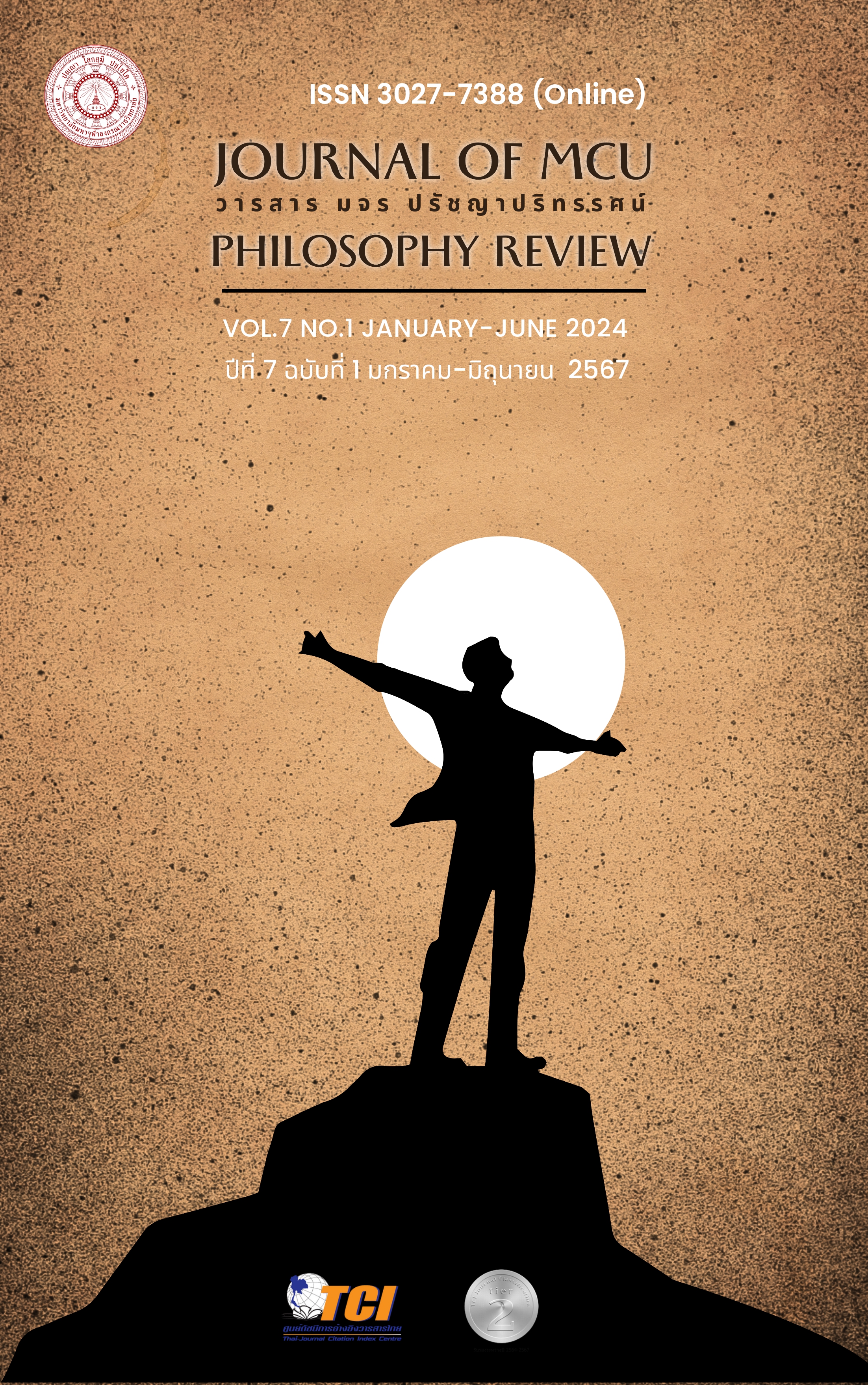การลงโทษเพื่อแก้ไขฟื้นฟูในทรรศนะของพุทธปรัชญา
Main Article Content
บทคัดย่อ
บทความนี้มีวัตถุประสงค์เพื่อศึกษาทฤษฎีว่าด้วยวัตถุประสงค์ของการลงโทษในทรรศนะของพุทธปรัชญา โดยใช้วิธีการศึกษาจากเอกสารและงานวิจัยที่เกี่ยวข้อง ผลการศึกษาพบว่า พุทธปรัชญาสนับสนุนทฤษฎีการลงโทษเพื่อแก้ไขพื้นฟูมากกว่าทฤษฎีการลงโทษเพื่อแก้แค้นทดแทน เหตุผลสนับสนุนก็คือ (1) ทั้งผู้กระทำความผิดและผู้ที่ตกเป็นเหยื่อต่างก็มีธรรมชาติของพุทธะเหมือนกันที่สามารถพัฒนาตนเป็นคนดีได้ (2) มนุษย์มักจะถูกครอบงำด้วยความโลภ ความโกรธ และความหลง แต่มนุษย์ก็สามารถลดละกิเลสและพัฒนาตนเองให้เป็นคนดีได้ (3) การใช้ความรุนแรงโดยรัฐไม่สามารถนำไปสู่การแก้ไขปัญหา แต่การใช้ความรุนแรงเพื่อแก้ปัญหาจะนำไปสู่การสร้างปัญหาเพิ่มมากขึ้น ดังที่กล่าวไว้ในจักกวัตติสูตร (4) การลงโทษในพระวินัยของสงฆ์ไม่มีการลงโทษทางร่างกาย แต่เน้นการลงโทษเพื่อปรับปรุงแก้ไขและให้การศึกษาแก่ผู้กระทำความผิด และ (5) พุทธปรัชญามีแนวความคิดการแก้ไขฟื้นฟูฆาตกรต่อเนื่อง ดังที่ปรากฏในอังคุลิมาลสูตร ซึ่งข้อเสนอของพุทธปรัชญาดังกล่าวนี้สามารถนำไปประยุกต์ใช้เพื่อปรับปรุงระบบการลงโทษและระบบยุติธรรมของประเทศไทยที่ควรให้ความสำคัญกับความยุติธรรมเชิงสมานฉันท์มากกว่าความยุติธรรมเชิงแก้แค้นทดแทนมากขึ้น
Article Details

อนุญาตภายใต้เงื่อนไข Creative Commons Attribution-NonCommercial-NoDerivatives 4.0 International License.
บทความที่ได้รับการตีพิมพ์เป็นลิขสิทธิ์ของวารสาร มจร ปรัชญาปริทรรศน์
ข้อความในบทความที่ได้รับการตีพิมพ์ในวารสาร ถือเป็นความรับผิดชอบของผู้เขียนบทความ และข้อคิดเห็นนั้นไม่ถือว่าเป็นทัศนะและความรับผิดชอบของกองบรรณาธิการวารสาร มจร ปรัชญาปริทรรศน์
เอกสารอ้างอิง
กรกฎ ทองขะโชค. (2561). “กระบวนการยุติธรรมเชิงสมานฉันท์และสันติวิธีของศูนย์ยุติธรรมชุมชนในจังหวัดชายแดนภาคใต้”. วารสารนิติศาสตร์ มหาวิทยาลัยนเรศวร. ปีที่ 11 ฉบับที่ 1 มกราคม-มิถุนายน. 138-140.
คณะวิชาการ (2566). ประมวลกฎหมายอาญา. กรุงเทพมหานคร: ห้างหุ้นส่วนจำกัด พิมพ์อักษร.
จุฑาภัค หริรักษ์ธำรง. (2560). “รูปแบบการบรรลุธรรมในพระพุทธศาสนาเถรวาท”. ดุษฎีนิพนธ์พุทธศาสตรดุษฎีบัณฑิต. บัณฑิตวิทยาลัย : มหาวิทยาลัยมหาจุฬาลงกรณราชวิทยาลัย.
ประวิทย์ เปรื่องการ. (2560). “ความยุติธรรมในการลงโทษทางวินัยในทรรศนะของพุทธปรัชญาเถรวาท”. ดุษฎีนิพนธ์พพุทธศาสตรดุษฎีบัณฑิต. บัณฑิตวิทยาลัย : มหาวิทยาลัยมหาจุฬาลงกรณราชวิทยาลัย.
ปาริชาติ โชคเกิด. (2563). “ไทยติดอันดับ Top 10 มีผู้ต้องขังล้นคุกมากมาย ไม่แพ้ชาติใดในโลก”. (ระบบออนไลน์). แหล่งที่มา https://brandinside.asia/most-prisoners-world-top-10-ranking-in-2021/ (3 ธ.ค. 65).
พระมหาขวัญชัย กิตฺติเมธี. (2560). “แนวคิดเรื่องนิรโทษกรรมในพุทธปรัชญาเถรวาท”. วารสารสันติศึกษาปริทรรศน์ มจร. ปีที่ 5 ฉบับที่ 3 เดือน กันยายน – ธันวาคม. 386-387.
พระมหาอุดม สารเมธี (สารบรรณ). (2546). “การศึกษาเปรียบเทียบกระบวนการยุติธรรมในพระพุทธศาสนา : ศึกษาเฉพาะกรณีนิคหกรรมในพระวินัยปิฎกกับกฎนิคหกรรมของมหาเถรสมาคม”. วิทยานิพนธ์พุทธศาสตรมหาบัณฑิต. บัณฑิตวิทยาลัย : มหาวิทยาลัยมหาจุฬาลงกรณราชวิทยาลัย.
มงคล เทียนประเทืองชัย. (2557). “แนวคิดเรื่องความยุติธรรมทางสังคมในพุทธปรัชญาเถรวาท”. วารสารมนุษยศาสตร์. ปีที่ 21 ฉบับที่ 2 กรกฎาคม-ธันวาคม. 180.
มหาจุฬาลงกรณราชวิทยาลัย. (2539). พระไตรปิฎกภาษาไทย ฉบับมหาจุฬาลงกรณราชวิทยาลัย. กรุงเทพมหานคร: โรงพิมพ์มหาจุฬาลงกรณราชวิทยาลัย.
สมเด็จพระพุทธโฆษาจารย์ (ป.อ.ปยุตฺโต). (2564). พุทธธรรม ฉบับปรับขยาย. พิมพ์ครั้งที่ 56. กรุงเทพมหานคร : โรงพิมพ์ บริษัท สหธรรมิก จำกัด.
สิทธิกร ศักดิ์แสง. (2559). “ความผิดอาญาที่ควรนำมาใช้ในกระบวนการยุติธรรมเชิงสมานฉันท์กับการระงับข้อพิพาทชั้นพนักงานสอบสวน”. วารสารสุทธิปริทัศน์. ปีที่ 30 ฉบับที่ 93 มกราคม-มีนาคม. 50-51.
Bill Keller. (2022). What’s Prison For? Punishment and Rehabilitation in the Age of Mass Incarceration. New York: Columbia Global.
Craig Russell. (2007). Alternatives to prison : Rehabilitation and other programs. Pennsylvania: Mason Grest.
David M. Kennedy. (2009). Deterrence and Crime Prevention. New York: Routledge.
David R. Loy. (2000). “How to Reform a Serial Killer: The Buddhist Approach to Restorative Justice”. Journal of Buddhist Ethics 7. pp. 145-168.
Leo Zaibert. (2006). Punishment and Retribution. England: Ashgate.
Matthew C. Altman. (2021). A Theory of Legal Punishment. New York: Routledge.
Michael J. Sandel. (2554). ความยุติธรรม แปลจากเรื่อง JUSTICE: WHAT’S THE RIGHT THING TO DO?. แปลโดย สฤณี อาชวานันทกุล. กรุงเทพมหานคร: สำนักพิมพ์ openworlds.
Somparn Promta. (2017). Wisdom and Politics: A Political Theory Based on the Integrated Thoughts of Karl Marx, Charles Darvin, and the Buddha. Bangkok: Wisdom Magazine Publishing House. pp.182-184.
Thom Brooks. (2014). Retribution. New York: Routledge.
Thom Brooks. (2021). Punishment: A Critical Introduction. 2nd edition. New York: Routledge.
William Spelman. (1994). Criminal Incapacitation. New York: Plenum.


